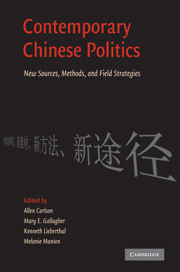Book contents
- Frontmatter
- Contents
- Tables and Figures
- Contributors
- Abbreviations
- Introduction
- Part I Sources
- Part II Qualitative Methods
- 7 The Worm’s-Eye View
- 8 More Than an Interview, Less Than Sedaka
- 9 Cases, Questions, and Comparison in Research on Contemporary Chinese Politics
- Part III Survey Methods
- Reflections on the Evolution of the China Field in Political Science
- Glossary
- References
- Index
8 - More Than an Interview, Less Than Sedaka
Studying Subtle and Hidden Politics with Site-Intensive Methods
Published online by Cambridge University Press: 05 June 2012
- Frontmatter
- Contents
- Tables and Figures
- Contributors
- Abbreviations
- Introduction
- Part I Sources
- Part II Qualitative Methods
- 7 The Worm’s-Eye View
- 8 More Than an Interview, Less Than Sedaka
- 9 Cases, Questions, and Comparison in Research on Contemporary Chinese Politics
- Part III Survey Methods
- Reflections on the Evolution of the China Field in Political Science
- Glossary
- References
- Index
Summary
The field of Sinology has benefited greatly in the past twenty years from a rich array of studies based on ethnography and participant observation. Anthropologists, not surprisingly, have led the way (Bruun, 1993; Chen, 2003; Fong, 2004; Friedman, 2006; Gladney, 1996; Hertz, 1998; Jacka, 2004; Jankowiak, 1993; Jing, 1996; Judd, 1994; Kipnis, 1997; Litzinger, 2000; Liu, 2000; Murphy, 2002; Notar, 2006; Perkins, 2002; Pun, 2005; Rofel, 1999; Schein, 2000; Watson and Watson, 2004; Yan, 1996, 2003; Yang, 1994; Zhang 2001). A number of sociologists also embrace these methods (Calhoun, 1994; Chan, Madsen, and Unger, 1992, 2009; Farrer, 2002; Lee, 1998). Whatever its disciplinary origin, and whether the specific topic is interpersonal relationships or village governance or migrant entrepreneurs, much of this work is strongly political in orientation. It hardly seems possible to come away from such books without acquiring immensely valuable knowledge about the workings of power in China, particularly at the local level.
Several political scientists have applied versions of these research techniques in China as well. But these methods have a more problematic relationship with the discipline of political science. Though members of our field have long employed ethnography and participant observation (which I group together below under the term “site-intensive methods”), such approaches have never been seen as mainstream. The discipline is now going through a process of energetic debate over what constitutes important knowledge and what methods usefully contribute to such knowledge. Practitioners of other qualitative methods began some time ago to weigh in with articulate statements explaining how what they do fits into the process of building and testing political science theory. A new generation of ethnographers and participant observers has recently emerged as well (Schatz, 2009b). As Schatz notes, members of this group differ among themselves, with those identified as interpretivists challenging multiple aspects of the ontology and epistemology of mainstream political science. Others, he writes, carry out ethnographic work in a qualified neopositivist mode, one that “uses attention to detail to generate middle-range theories, that considers cumulative knowledge a possibility worth pursuing, and that is optimistic about the scholar’s potential to offer contributions” (Schatz, 2009a: 14). While I applaud the idea that politics should be studied from many perspectives, not merely those fitting within scientific paradigms, what I have to say here falls within the latter category. I argue that political scientists of many stripes can and should appreciate the value of the fieldwork techniques under discussion.
- Type
- Chapter
- Information
- Contemporary Chinese PoliticsNew Sources, Methods, and Field Strategies, pp. 145 - 161Publisher: Cambridge University PressPrint publication year: 2010
- 9
- Cited by



